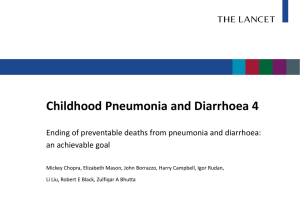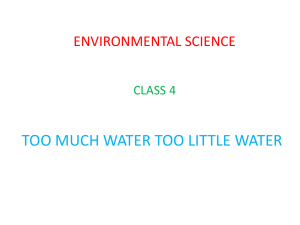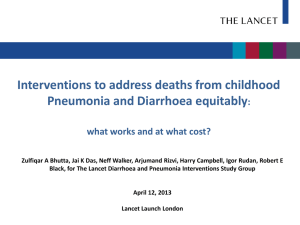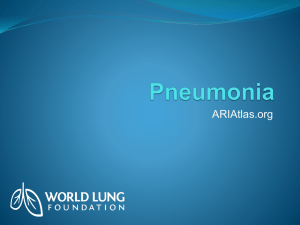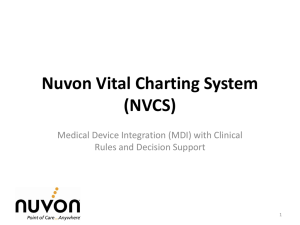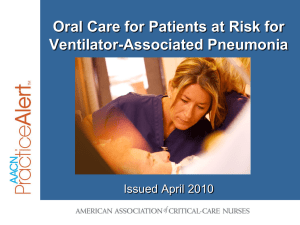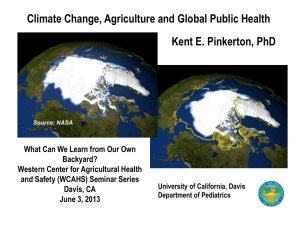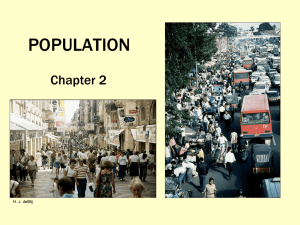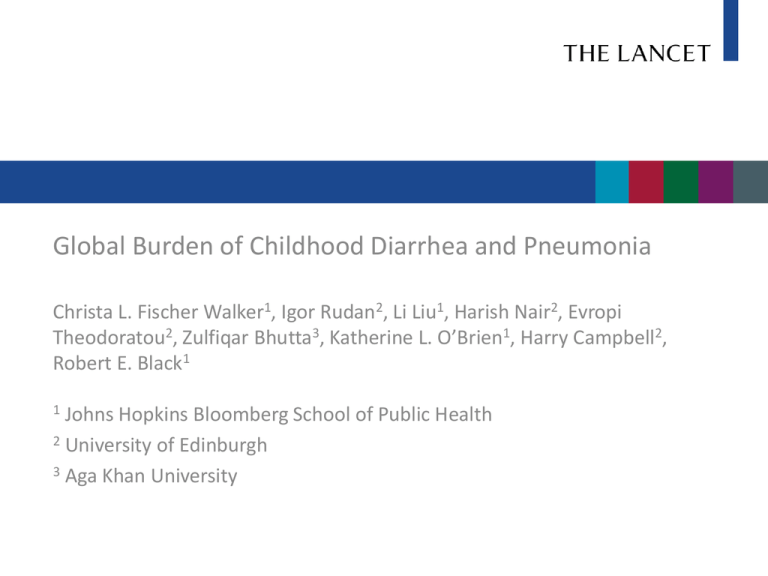
Global Burden of Childhood Diarrhea and Pneumonia
Christa L. Fischer Walker1, Igor Rudan2, Li Liu1, Harish Nair2, Evropi
Theodoratou2, Zulfiqar Bhutta3, Katherine L. O’Brien1, Harry Campbell2,
Robert E. Black1
1
Johns Hopkins Bloomberg School of Public Health
2 University of Edinburgh
3 Aga Khan University
A comprehensive
epidemiology review
• Morbidity and mortality from childhood diarrhoea and
pneumonia are falling, but action is needed globally and
at country level to accelerate the reduction
• We sought to compare and contrast the burden of
disease for diarrhea and pneumonia among children < 5
years of age
• We conducted 24 separate literature reviews to span the
full epidemiologic spectrum of disease including:
incidence, severe episodes, mortality, sequelae, age and
sex distribution, etiology and risk factors for diarrhoea
and pneumonia among children < 5 years of age
Regional burden of severe diarrhoea and
pneumonia episodes among children
aged 0-4 years in 2010
Diarrhoea
36.1 million episodes
WESTERN
PACIFIC
Pneumonia
14.1 million episodes
WESTERN
PACIFIC
5.5
AFRICA
1.4
AFRICA
9.6
SOUTHEAST
ASIA
4.2
SOUTHEAST
ASIA
9.3
5.4
0.8
4.8
THE AMERICAS
1.9
4.3
EUROPE
2.5
EASTERN
MEDITERRANEAN
THE AMERICAS
0.4
EUROPE
EASTERN
MEDITERRANEAN
Regional burden of diarrhoea and
pneumonia mortality among children
aged 0-4 years in 2011
Diarrhoea
711,800 deaths
Pneumonia
1,256,800 deaths
Western Pacific
Western Pacific 16.9
61.9
Africa
Africa
Southeast 227.7
Asia
353.3
Europe
6.3
Southeast 443.8
Asia
540.6
96.6
Eastern
Mediterranean
11 The Americas
Europe 18.1
168.4
23.9
Eastern
The Americas
Mediterranean
Distribution of cases of, and deaths from
diarrhoea and pneumonia in children age 0-4
yrs
Annual rates of change in diarrhea-specific and
pneumonia-specific mortality, 2000 - 2010
Diarrhoea and the risk of long-term
sequelae
• A single episode of diarrhoea is typically self-limiting
with ORS and zinc for treatment
• In low-income settings, multiple diarrhoea episodes
per year can increase odds of stunting such that the
proportion of stunting attributable to 5 episodes of
diarrhoea in the first 2 years of life is 25%
• Additional rare sequelae include: Guillain Barré
Syndrome, Reactive arthritis, Hemolytic Uremic
Syndrome
Pneumonia and the risk of long-term
sequelae
• The risk of at least one long-term major
sequela from pneumonia is 5.5% (95% CI: 2.88.3) in non-severe pneumonia and 13.6% (95%
CI: 6.2-21.1) in hospitalized severe pneumonia
• Sequelae include: reduction in lung volume
and bronchiectasis (0.9% of severe cases)
• The risk of sequelae is higher among children
< 2 years of age (13.4%, 95% CI: 4.5-22.3)
Vaccine-preventable causes of diarrhoea
severe morbidity and mortality
• Rotavirus is estimated to cause 28% of severe
diarrhoea, resulting in 9.9 million severe episodes and
more than 193,000 deaths
• Vibrio cholerae accounts for 1% of severe diarrhoea
resulting in an estimated 456,000 severe episodes
and 11,700 deaths
• Estimates are based on data collected over more than
20 years and thus do not account for yearly variation
as a result of epidemics or recent widespread
vaccination campaigns in selected countries
* Number of episodes correlates to 2011 estimates; number of deaths correlates to 2010 estimates
Vaccine-preventable causes of
pneumonia severe morbidity and
mortality
• Streptococcus pneumoniae is the most common
vaccine-preventable pathogen and accounts for
18.3% of severe episodes (2.6 million) and 32.7% of
deaths (411,000)
• Haemophilus influenzae type B accounts for 4.1% of
severe episodes (574,000) and 15.7% of deaths
(197,000)
• Influenza virus led to 982,000 episodes (7%) and
137,000 deaths (10.9%)
* Number of episodes correlates to 2011 estimates; number of deaths correlates to 2010 estimates
Nutritional Risk Factors and Increased
Risk of Mortality
• Lack of breastfeeding during the first 2 yeas of life
increases the risk of diarrhoea morbidity and
mortality and pneumonia mortality
Diarrhea Mortality
Lack of exclusive Partially breastfed
breastfeeding (0- RR = 4.62 (1.81 – 11.76)
5 mos)
Not breastfed
RR=10.52 (2.79-39.6)
Lack of any
breastfeeding (6- RR=2.18 (1.14-4.16)
23 mos)
Pneumonia Mortality
Partially breastfed
RR = 2.50 (1.03-6.04)
Not breastfed
RR = 14.97 (0.7-332.7)
Nutritional Risk Factors and Increased
Risk of Mortality
• Underweight, stunting, and wasting increase the risk of
mortality from both diarrhoea and pneumonia with the risk
increasing as the degree of undernutrition increases
Stunting
Stunted
-2 to <-1 HAZ
-3 to <-2 HAZ
<-3 HAZ
Diarrhoea
OR = 1.2 (0.9 – 1.7)
OR= 1.6 (1.1-2.5)
OR = 4.6 (2.7-8.1)
Pneumonia
OR = 1 (0.6 – 1.6)
OR= 1.3 (0.9-2.1)
OR = 3.2 (1.5-6.7)
• Vitamin A deficiency increases the risk of mortality from
diarrhoea (RR =1.47) by increasing the risk of severe disease
• Zinc deficiency increases the risk of diarrhoea incidence
(RR=1.15) and severe pneumonia and may increases risk of
both diarrhoea and pneumonia mortality
Key Messages and Discussion
• Diarrhoea and pneumonia remain the leading infectious
causes of death in children younger than 5 years, and
together caused an estimated 2 million deaths, in 2011.
• 72% of deaths associated with diarrhoea and 81% of
those associated with pneumonia happen in the first 2
years of life, suggesting that an increased emphasis on
prevention and treatment in neonates and children
younger than 2 years is crucial
• The global burden of incidence and severe disease for
both diarrhoea and pneumonia is highest in southeast
Asia and Africa.
Key Messages and Discussion
• Nearly 1/3 of episodes of severe diarrhoea are
preventable by vaccination (i.e., against rotavirus and
cholera).
• At least 1/3 of severe episodes and 2/3 of deaths are
caused by vaccine-preventable pneumonias
(Streptococcus pneumoniae, Haemophilus influenzae, and
the influenza virus).
• Nearly ¾ of diarrhoea and pneumonia mortality are
concentrated in 15 high-burden countries yet data sources
from these countries are scant
• Undernutrition is a key shared risk factor for morbidity
and mortality associated with diarrhoea and pneumonia

